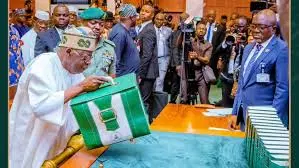
A heated controversy has erupted between the National Assembly and civic tech organization BudgIT over the insertion of 11,122 projects worth N6.93 trillion into the proposed 2025 Appropriation Bill.
BudgIT, known for promoting transparency in public finance, accused lawmakers of padding the national budget with projects that allegedly do not align with the Medium-Term National Development Plan (2021–2025) and other critical national priorities.
In a swift response, both chambers of the National Assembly—the Senate and the House of Representatives—dismissed the allegations, asserting their constitutional authority to amend the national budget as provided by the 1999 Constitution.
BudgIT Alleges Culture of Abuse and Exploitation
In its statement released yesterday, BudgIT said that lawmakers have turned budget irregularities into a “deeply entrenched culture of exploitation,” claiming that the 2025 budget has become a tool for self-serving political interests, particularly among top-ranking legislators.
BudgIT disclosed that:
- 238 projects worth over N5 billion each, totaling N2.29 trillion, were inserted without adequate justification.
- 984 projects valued at N1.71 trillion and 1,119 projects ranging between N500 million and N1 billion (totaling N641.38 billion) were also indiscriminately included.
According to BudgIT, many of these insertions appear to serve narrow political agendas rather than the needs of Nigerian citizens.
Breakdown of Alleged Project Insertions
BudgIT provided further details, revealing that:
- 3,573 projects valued at N653.19 billion were assigned to federal constituencies.
- 1,972 projects worth N444.04 billion were designated for senatorial districts.
- 1,477 streetlight projects worth N393.29 billion, 538 boreholes totaling N114.53 billion, and 2,122 ICT projects valued at N505.79 billion were included.
- N6.74 billion was allocated for the empowerment of traditional rulers.
BudgIT also revealed that 39% of all inserted projects—4,371 projects worth N1.72 trillion—were added to the Ministry of Agriculture’s budget, inflating its capital allocation from N242.5 billion to N1.95 trillion.
The Ministries of Science and Technology and Budget and Economic Planning also received inflated allocations of N994.98 billion and N1.1 trillion, respectively, due to insertions.
Agencies Misused for Political Projects
The report highlighted the alleged misuse of federal agencies such as the Nigerian Building and Road Research Institute (Lagos) and the Federal Cooperative College, Oji River, which were overloaded with politically-motivated projects unrelated to their core functions.
Examples include:
- N3 billion for utility vehicles for farmers.
- N1.5 billion for rural electrification in Rivers State.
- N1 billion for solar streetlights in Enugu State.
BudgIT stated that these agencies lack the technical capacity to execute such projects, which often leads to underperformance and waste.
Call to Action and Presidential Silence
BudgIT criticized the Presidency’s silence on the issue despite previous efforts to notify the Budget Office, the National Assembly, and the Presidency itself through formal letters.
“Despite overwhelming evidence, no institution has responded or taken responsibility for these anomalies. This silence from the Presidency amounts to complicity,” the statement read.
Gabriel Okeowo, BudgIT’s Country Director, stressed the urgent need for budgetary reform, describing the insertions as an assault on fiscal responsibility and a major obstacle to national development.
“The insertion of over 11,000 projects worth N6.93 trillion into the 2025 budget by the National Assembly is deeply troubling. We must restore integrity to the budgeting process and ensure it serves the Nigerian people, not political elites,” Okeowo said.
BudgIT called on:
- President Bola Ahmed Tinubu to exercise executive leadership and reform the budget process.
- The Attorney-General of the Federation to seek constitutional clarification from the Supreme Court.
- EFCC and ICPC to investigate and track the inserted projects.
- Citizens, the media, and civil society to demand accountability and transparency.
National Assembly Defends Budget Process
Senator Yemi Adaramodu, Chairman of the Senate Committee on Media and Public Affairs, dismissed the allegations as baseless, saying the budget was passed based on the figures submitted by the executive after legislative interrogation.
He accused critics of spreading falsehood and propaganda, claiming they were attempting to incite public disaffection against the National Assembly.
“There has been a lull in their trade of irreverent propaganda, hence the latest spurious allegation of budget padding,” Adaramodu said.
Clement Jimbo, Deputy Chairman of the House Committee on National Planning and Economic Development, also dismissed BudgIT’s claims, describing them as misinformed and ignorant of the legislature’s constitutional role.
He explained that the budget sent by the executive is only an estimate, and the National Assembly has full authority to review, amend, subtract, or add to it before passing it into law.
“We are not a rubber stamp. If the executive sends a budget that doesn’t reflect the aspirations of Nigerians, we have the power to change it,” Jimbo said.
He also rejected suggestions that individual lawmakers could arbitrarily divert funds, emphasizing that nearly 200 committees were involved in budget defense sessions with government ministries and agencies.
“I have been part of the 2023, 2024, and 2025 budget processes. I have never seen any lawmaker single-handedly divert funds to personal projects,” Jimbo concluded.
